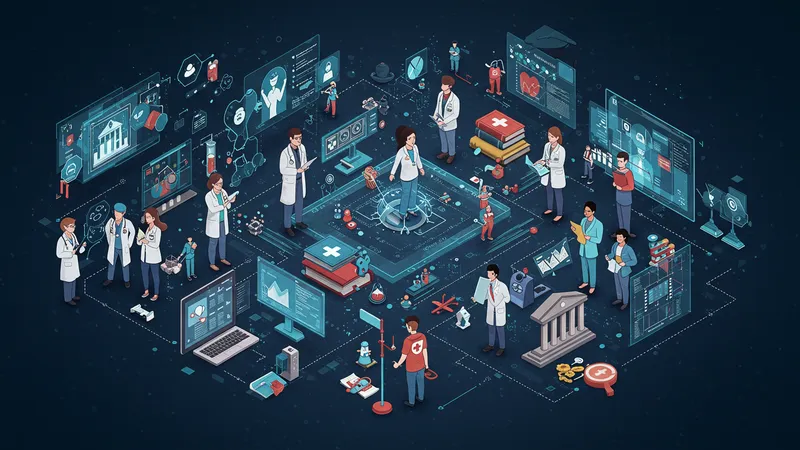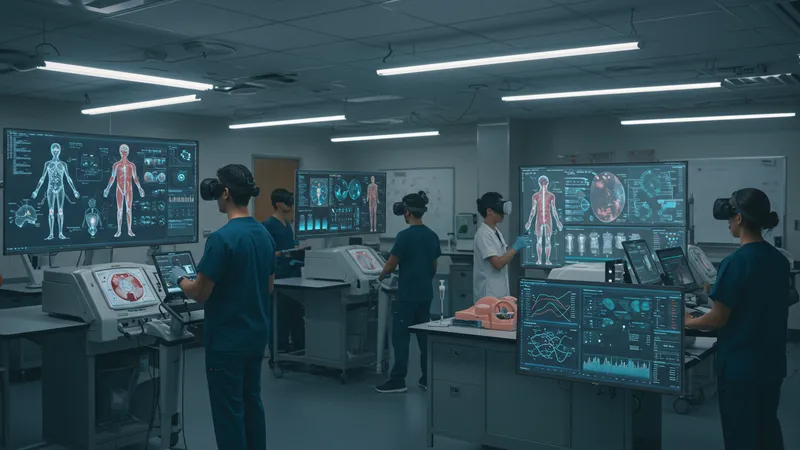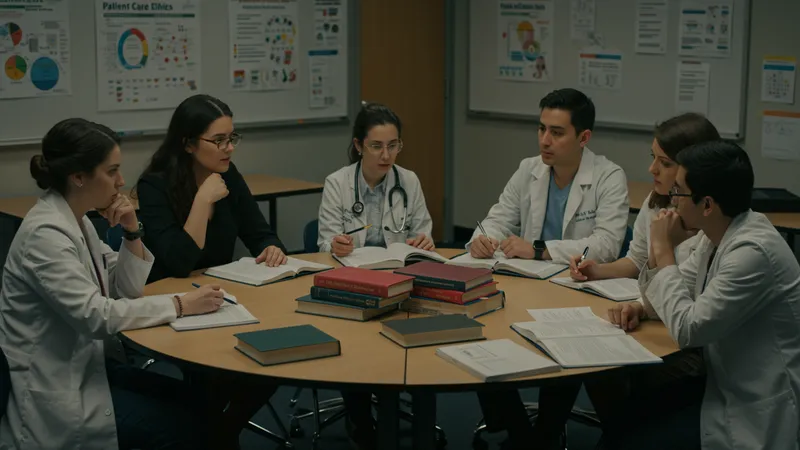


Did you know that the most unexpected breakthrough in global healthcare isn't a wonder drug or new surgical method? It's the surge in professionals pursuing diverse healthcare degrees! This trend is reshaping the entire industry landscape.
In an era where healthcare is rapidly evolving, understanding the nuances of healthcare degrees is more crucial than ever. With seismic shifts in patterns, it’s becoming increasingly evident that these pathways are a goldmine of opportunity.

The rise of healthcare degrees isn't as straightforward as it seems. While many associate them solely with nursing and medicine, there’s an explosive diversity in options — from health informatics to genetic counseling, these degrees are more varied than public perception suggests. Surprisingly, these non-traditional paths often see graduates swiftly moving into high-paying roles with rapid growth potential. But that’s not even the wildest part…
Even seasoned professionals are delving back into academia to pursue these degrees, unveiling a curious trend of mid-career pivots like never before. This shift is fueled by the realization that the healthcare sector is far more dynamic than many previously thought. As financial incentives blossom, with certain professionals seeing a pay increase upwards of 50%, it's leaving many to wonder — what does the future truly hold for those who embrace these degrees? What happens next shocked even the experts…
When most people think of healthcare degrees, they often picture doctors and nurses. However, modern education offers a surprisingly broad array of specialized fields. Health informatics, public health administration, and even medical ethics are just the tip of the iceberg. These areas not only cater to healthcare but also integrate technology, policy-making, and corporate ethics, offering professionals versatile and lucrative career paths. What you read next might change how you see this forever.

With the growth of technology, health informatics has emerged as a critical field, harnessing the power of data to improve patient outcomes. This specialty is so essential that graduates are seeing job offers before even finishing their programs. A degree in health informatics opens doors to roles that blend IT solutions with healthcare delivery, creating a bridge between the two industries. But there’s one more twist…
Moreover, public health administration degrees are gaining traction, focusing on policy development and community health strategies. These programs train students to lead public health initiatives, impacting communities on a macro scale. Communities worldwide are in dire need of skilled administrators to navigate complex health challenges, making this an exciting career path. Yet, there’s an even more startling revelation ahead.
Medical ethics is becoming a popular degree choice, reflecting society’s growing interest in the moral implications of medical practice and biotechnological advances. The intricate questions posed by rapid technological progress demand thoughtful scrutiny, making graduates vital in shaping the future of ethical healthcare standards. This discipline merges history, philosophy, and law, offering nuanced career opportunities that many haven't considered. As for what's next, it's bound to flip the script again.
Pursuing a healthcare degree may seem like a straightforward choice, but hidden costs often catch students off guard. Beyond the obvious tuition fees, there's an array of supplementary expenses that can inflate the bill. Travel costs for clinical placements, specialized equipment, and unexpected coursework materials can double initial estimates, leaving students financially strained. However, some institutions are stepping up with financial aid programs that genuinely alleviate these burdens — yet, not all institutions are transparent about these costs.

Consider the insidious impact of time and energy on aspiring healthcare professionals. The rigorous demands of coursework, combined with practical placements, can lead to burnout if not properly managed. This time investment often means sacrificing potential income from jobs they might hold otherwise. Balancing these commitments requires strategic planning and determination, acting almost as a secondary curriculum in time management and personal resilience. But here’s where it gets really complex...
Yet, the real kicker lies in the opportunity cost. Delaying entry into the workforce by several years can significantly impact lifetime earnings. While healthcare degrees promise high wages post-graduation, the time spent out of full-time work can initially set graduates back financially. Understanding this trade-off is crucial for prospective students when they weigh the immediate drawbacks against long-term gains. And trust me, the plot thickens further!
Moreover, students often overlook the indirect costs associated with healthcare degrees — like stress on personal relationships and mental health challenges. The pressure of maintaining high academic standards while planning future careers can strain students' well-being. Institutions offering psychological and career planning support can ease this burden, but students must be proactive in accessing these resources. The deeper we go, the more we uncover the complexities beneath the surface!
For those who think healthcare degrees strictly lead to hospitals or clinics, the real scenarios unfolding in the field might surprise you. Graduates are finding roles in diverse sectors like technology firms, government policy-making, and global health organizations. The adaptability of healthcare professionals makes them especially valuable across industries, where their unique insights into medical systems can drive innovation. But the real opportunity lies undiscovered in many traditional organizations.

The growing need for cross-disciplinary knowledge sees healthcare graduates venturing into the tech industry, where they collaborate with developers to create impactful health apps and technologies. These roles leverage their expertise to ensure these products remain clinically relevant and user-friendly, merging healthcare knowledge with cutting-edge innovation. The narrative shifts dramatically when you learn about the explosive demand in these roles.
Global health organizations are actively scouting healthcare graduates to lead programs aimed at tackling international health challenges. The focus ranges from disease eradication to health education in underdeveloped regions, offering fulfilling opportunities to make a significant impact. These roles not only address urgent needs but also offer perspectives that enrich professional and personal growth. It’s a story of transformation that’s just getting started.
Meanwhile, the corporate sector is also recognizing the value healthcare professionals bring to the table. After all, understanding health policies and employee wellness programs are critical to fostering healthy organizational cultures. Companies are rolling out the red carpet for those who can navigate complex health dynamics within the corporate structure. Trust me, this shift is redefining traditional roles, and it’s turning heads everywhere!
One of the astonishing shifts in healthcare education lies in how barriers are crumbling, opening doors to more students than ever before. The advent of online courses and flexible learning paths allows individuals from various backgrounds to pursue specialized degrees without the need to physically relocate or alter their lives significantly. As more institutions adopt these methods, education becomes accessible to a broader audience, dismantling socioeconomic barriers once deemed insurmountable.

Online learning platforms are innovating through virtual labs and interactive simulations that replicate real-world healthcare scenarios. This tech-driven approach not only enhances learning but makes it possible for students to gain practical skills from their living rooms. The endless possibilities offered by this format are causing ripple effects throughout the field, pushing traditional learning methods to adapt or be left behind in this educational revolution.
Additionally, institutions are revamping program costs, offering income-based scholarships, and payment plans that mirror the compassionate core of healthcare itself. Accessibility doesn't just mean physical entry, but financial feasibility too. The success stories pouring in from these reforms testify to the power of inclusivity in education. These measures are not an endpoint but a stepping stone to further democratization of healthcare education.
Yet, the question remains: Is the industry prepared to accommodate this influx of newly educated professionals? With more graduates than ever entering the workforce, the pressure is on to create roles that can utilize their fresh perspectives while honoring their comprehensive training. This educational shift is creating a new paradigm, one that’s begging industries to rethink not just hiring practices but the very structure of modern healthcare work environments.
Telehealth, once a nascent concept, has blossomed into a pivotal healthcare delivery model, creating unexpected career pathways. With the global health crisis acting as a catalyst, the demand for telehealth services has soared, necessitating a new wave of professionals trained specifically in this field. The technological prowess combined with healthcare expertise has never been more relevant, paving the way for a blossoming career field.

The skill set required for telehealth services goes beyond clinical knowledge. Professionals must grasp ICT tools, patient privacy laws, and virtual communication techniques to thrive. Because of this, universities are now integrating telehealth modules into their healthcare curricula, preparing students to deliver high-quality care remotely. It's a bold new frontier in education that’s marrying healthcare with technology in unprecedented ways.
Moreover, telehealth is not just limited to providing remote medical consultations. It's expanding into arenas like mental health, offering innovative platforms for therapy and counseling that reach underserved demographics. The potential for tele-mental health is enormous, breaking down barriers for patients who otherwise might not access services due to stigma or geography. This unforeseen expansion is reshaping old narratives about healthcare access.
Yet, as telehealth careers become more prevalent, challenges arise. Licensing regulations, data security, and ethical considerations demand novel administrative frameworks to handle these developments efficiently. However, where there are challenges, there are also opportunities for growth and leadership roles never before imagined in traditional healthcare settings. The evolution of telehealth promises to be a storytelling saga in its own right!
The advancement of healthcare education hinges significantly on the technological tools redefining teaching methods. Simulation software, interactive AI-driven learning aides, and comprehensive disease databases are transforming the educational experience. These tools not only enrich the curriculum but also enhance the foundational structure of healthcare studies, preparing students for a world where tech-enabled care is the norm.

Simulation software, once the stuff of dreams, provides students the opportunity to engage in practical scenarios without any real-world risks. This technology allows them to practice procedures, diagnose patients, and even manage virtual care teams effectively. Institutions investing in high-quality simulation labs are creating powerful submerged learning experiences that set their graduates apart in the healthcare field.
Artificial Intelligence-driven tools are becoming staples in healthcare classrooms. These platforms closely mimic real-world brain responses, giving students the chance to diagnose complex conditions through an interactive and dynamic learning process. The incorporation of AI helps demystify multiple facets of patient care, making it indispensable in modern curricula. It's a breakthrough that promises never-ending innovation in educational practices.
Comprehensive disease databases are increasingly vital for healthcare students. These repositories offer detailed insights into disease progression, epidemiology, and treatment outcomes. By analyzing such dynamic datasets, students gain a robust understanding of global health trends, fostering a new generation of data-savvy medical professionals. The scope of what's possible with these tools is as vast as the imagination of the students who use them.
Healthcare management degrees, often overshadowed by clinical roles, hold immense significance in orchestrating the seamless operation of healthcare institutions. These degrees groom students to navigate healthcare systems, manage budgets, and implement policy changes, crucial in a landscape where operational efficacy is paramount. Management roles ensure that clinical environments run smoothly, yet their complexity is often largely underestimated.

Graduates with healthcare management credentials find themselves at the helm of administrative decision-making. Whether steering new projects or streamlining existing processes, they influence the health sector's efficiency with their strategic vision. The requirement for such nuanced understanding in these roles calls for specialized training, one that requires deft handling of intricate systems unique to healthcare.
The increasing complexity of healthcare systems itself has propelled demand for skilled managers who can balance clinical outcomes with fiscal responsibilities. Training programs focusing on healthcare law, ethics, and risk management equip graduates to preempt challenges and ensure regulatory compliance. This knowledge reaches far beyond spreadsheets, intertwining with every aspect of patient care initiatives.
Interestingly, as management roles evolve, they present unmatched career advancement opportunities. Healthcare executives who've climbed the ranks highlight mentorship, strategic partnerships, and continual professional development as pillars of their ascent. Pursuing an advanced degree in healthcare management is not merely an educational endeavor but a pathway into leadership roles that shape societal health landscapes.
As healthcare continues to evolve, the importance of ethics in education cannot be overstated. Ethical training is paramount, as it introduces critical thinking frameworks regarding patient dignity, equity, and justice. This education equips students to tackle moral questions that increasingly confront practitioners in this dynamically shifting landscape.

Medical schools are weaving ethics throughout their curricula, ensuring that students are not only scientifically adept but ethically grounded. This comprehensive approach cultivates healthcare providers who can navigate the intricate interplay of technical prowess and moral responsibility—a balance crucial in maintaining public trust and patient welfare.
The focus on ethics particularly prepares professionals to face emergent issues such as genetic engineering, data privacy, and end-of-life care. The explosive growth in biotechnology thrusts moral implications to the forefront, challenging traditional ethical boundaries. The curriculum, therefore, becomes an ethical compass, guiding students through uncharted waters with knowledge and accountability.
Moreover, ethics training is instrumental in fostering a culture of empathy and patient-centered care. Beyond technical skill and knowledge application, healthcare work demands interaction with vulnerable patients, recognizing their autonomy, and placing their dignity at the center of all decision-making processes. This understanding is a cornerstone in ethical education and integral in producing well-rounded healthcare professionals equipped for the ethical challenges of tomorrow.
The integration of AI in healthcare education is reshaping traditional learning models. With machine learning algorithms capable of personalizing education, students receive instant feedback, enhancing their learning curve significantly. This AI-driven approach not only addresses individual knowledge gaps but also prepares students for real-world scenarios where AI increasingly assists in diagnostics and treatment plans.

Examples of AI in education include virtual patient scenarios that adapt based on student interactions, providing a sophisticated, interactive learning environment. Such tools replicate intricate human responses, enabling students to refine their clinical reasoning skills before beginning real-world clinical practice. This technological leverage is transforming the landscape of healthcare learning in profound ways.
Moreover, AI’s role goes beyond the classroom, providing researchers with powerful analytics to study learning patterns and innovate curriculums. Using data-driven insights,educators can adapt teaching strategies tailored to evolving healthcare demands, ensuring students are always learning the most relevant and cutting-edge material. Such shifts represent a leap toward educational models that are as dynamic as the health sector itself.
However, the promise of AI also brings ethical challenges that educators must address. Issues of data privacy, AI biases, and the limitations of technology in teaching human care are critical concerns. In filtering AI’s role in healthcare education, we must balance innovation with caution, ensuring that AI complements human teaching rather than replacing the indispensable human elements of empathy, judgment, and discussion.
Cultural competence, an increasingly integral part of healthcare education, ensures practitioners can deliver care that respects and responds to diverse patient backgrounds. With globalization and migration intensifying, understanding varying cultural beliefs, practices, and communication styles has become crucial in effective healthcare delivery.

Degrees now incorporate cultural competence training, equipping students with skills to navigate multicultural settings effectively. This focus enriches doctor-patient interactions, enhances patient satisfaction, and improves adherence to medical advice, ultimately leading to better health outcomes. The dividend? A healthcare ecosystem responsive to the global tapestry it serves.
Moreover, the ramifications of cultural competence extend to health policy and public health initiatives. By appreciating diverse healthcare perspectives, graduates can influence policy creation, ensuring health systems are inclusive and accessible to all ethnicities and cultural backgrounds. The ability to view health challenges through a broader cultural lens is a powerful tool in public health strategy and critical for impactful global health programs.
Furthermore, cultural competence fosters collaborative environments within healthcare teams. Understanding cultural dimensions can reduce workplace conflicts, promote teamwork, and create shared mission-driven approaches. In essence, cultural competence is a cornerstone of modern healthcare, a transformer fostering inclusivity and harmonious interactions amid diversity. The journey continues into examining the broader implications...
One of the most daunting challenges for prospective healthcare students is financing their education. Yet, numerous funding options remain unexplored by many due to lack of awareness. Scholarships, grants, low-interest loans, and employer sponsorship programs are available but navigating them can be akin to finding hidden treasures. Understanding the range of financial aids is pivotal in alleviating the economic burden of healthcare degrees.

Scholarships stand as a beacon for students, offered by universities, private organizations, and professional associations. These merit-based aids are coveted and require navigating competitive landscapes. Hence, students need to maximize their eligibility by maintaining high academic performance and participating in extracurriculars, which makes them attractive candidates for these financial opportunities.
Beyond scholarships, federal and state grants offer non-repayable funding that significantly eases financial pressure. Programs like the Free Application for Federal Student Aid (FAFSA) provide students with need-based assistance, often covering a substantial portion of education costs. The key for students is timely application and understanding the documentation process, which opens doors to significant savings.
Employer sponsorship programs are a less traditional but growing method of funding healthcare education. Employers, recognizing the benefits of educated staff, offer tuition reimbursement plans or pay directly for degrees as a form of professional development. Navigating these opportunities calls for students to explore benefits outlined in employment polices or negotiate potential sponsorship constructs effectively. The quest for funding leads to unexpected and potentially lucrative pathways in educational achievements.
The intersection of various disciplines in healthcare education opens up exciting avenues and comprehensive skill sets. As technology, environmental science, and social psychology increasingly influence healthcare, interdisciplinary studies become inevitable to cultivate well-rounded professionals ready for multi-faceted challenges.

Programs that blend healthcare with engineering, for instance, pave the way for breakthroughs in medical device development and biotechnological innovation. These cross-discipline students bring a wealth of knowledge, fostering innovation at the intersections of these fields, resulting in cutting-edge solutions that traditional pathways might miss.
Similarly, the merger of environmental science and healthcare creates experts capable of addressing pressing issues like climate-related health effects. From understanding disease vectors in changing climates to implementing sustainable healthcare practices, interdisciplinary graduates are uniquely equipped to tackle the complexities of our environmental reality.
Social sciences are also essential to a comprehensive healthcare education. Programs that blend medicine with psychology or sociology give insight into the human behaviors affecting healthcare. This understanding leads to more effective health interventions, nuanced patient care, and policies that reflect the human element of healthcare. The future is bright for those who embrace these multifaceted educational pathways that print a bolder canvas across healthcare systems.
Traditionally dominated by general medicine and nursing, healthcare is now witnessing an escalating demand for specialized roles. Disciplines like pediatric oncology, geriatric care, and precision medicine are gaining traction due to their tailored approaches, promising future-ready career pathways for students and responding to evolving patient needs.
In pediatric oncology, professionals are trained to not only address medical treatments but also support the emotional and developmental needs of young patients. This specialization demands high empathy and the ability to blend innovative treatments with compassionate care. Careers in this field are deeply fulfilling and make a profound impact in both individual lives and the broader medical community.
The aging population worldwide has propelled geriatric care to the forefront of required specializations. Courses in this field focus on managing chronic illnesses, understanding aging processes, and improving the quality of life for elderly patients. Specialists in geriatrics are crucial as life expectancies rise, bringing demands for nuanced care that resonates with the complexities inherent to aging.
Precision medicine epitomizes the advancement of healthcare by customizing treatments according to genetic and environmental variances. This specialization harnesses genomics, molecular biology, and bioinformatics to revolutionize patient care. As healthcare gravitates towards customized treatments, precision medicine fosters an era where personalized could truly mean precise, signaling the direction of future healthcare education and practice.
Few industries offer the promise of job security like healthcare, an ever-expanding sector driven by enduring demands for skilled professionals. But job security is not merely about availability; it also springs from adaptability and the capacity to evolve with sectoral shifts. In essence, the secret lies in aligning one’s education with these dynamic demands.

Nursing remains one of the most secure healthcare pathways, with the aging population and healthcare reforms bolstering the need for skilled nurses. Innovations in nursing practices and research have further fragmented the field, offering specific roles that cater to diverse healthcare needs. The profession offers robust opportunities for job growth, often accompanied by flexibility and mobility across regions and specialties.
Technological advancements have also revitalized job security within healthcare, with IT roles like systems analysts and health information managers seeing robust increases in demand. The critical nature of data in healthcare drives demand for professionals who can interpret, secure, and leverage that information effectively. This trend symbolizes a significant shift towards tech-driven roles that integrate seamlessly with clinical environments.
Yet, beyond individual roles, job security within healthcare also encompasses interdisciplinary skills allowing for effortless transitioning between careers if necessary. Those expert in several competencies find multiple pathways open, fostering a holistic understanding of both core healthcare practices and auxiliary industries. Experience, plus the readiness to learn, acts as a forcefield, protecting against market fluctuations and ensuring continuous demand.
The revelations about healthcare degrees are profound, fundamentally transforming how education and career paths intersect. With the energetic push towards interdisciplinary studies, specialized fields, cultural competence, and tech-led innovations, the landscape is poised for dynamic change. There's a palpable sense of optimism for future graduates ready to leap into diverse, impactful roles that fit their skills and passions.
As we conclude this exploration into the world of healthcare degrees, it's clear that these programs offer immense value, opportunity, and fulfillment for those who prepare well. Whether you're considering a new career or seeking to enhance your current profession, exploring healthcare education could be your gateway to unimaginable horizons. Share this insight with friends and get ready for exciting trends that could ignite any career aspiration!